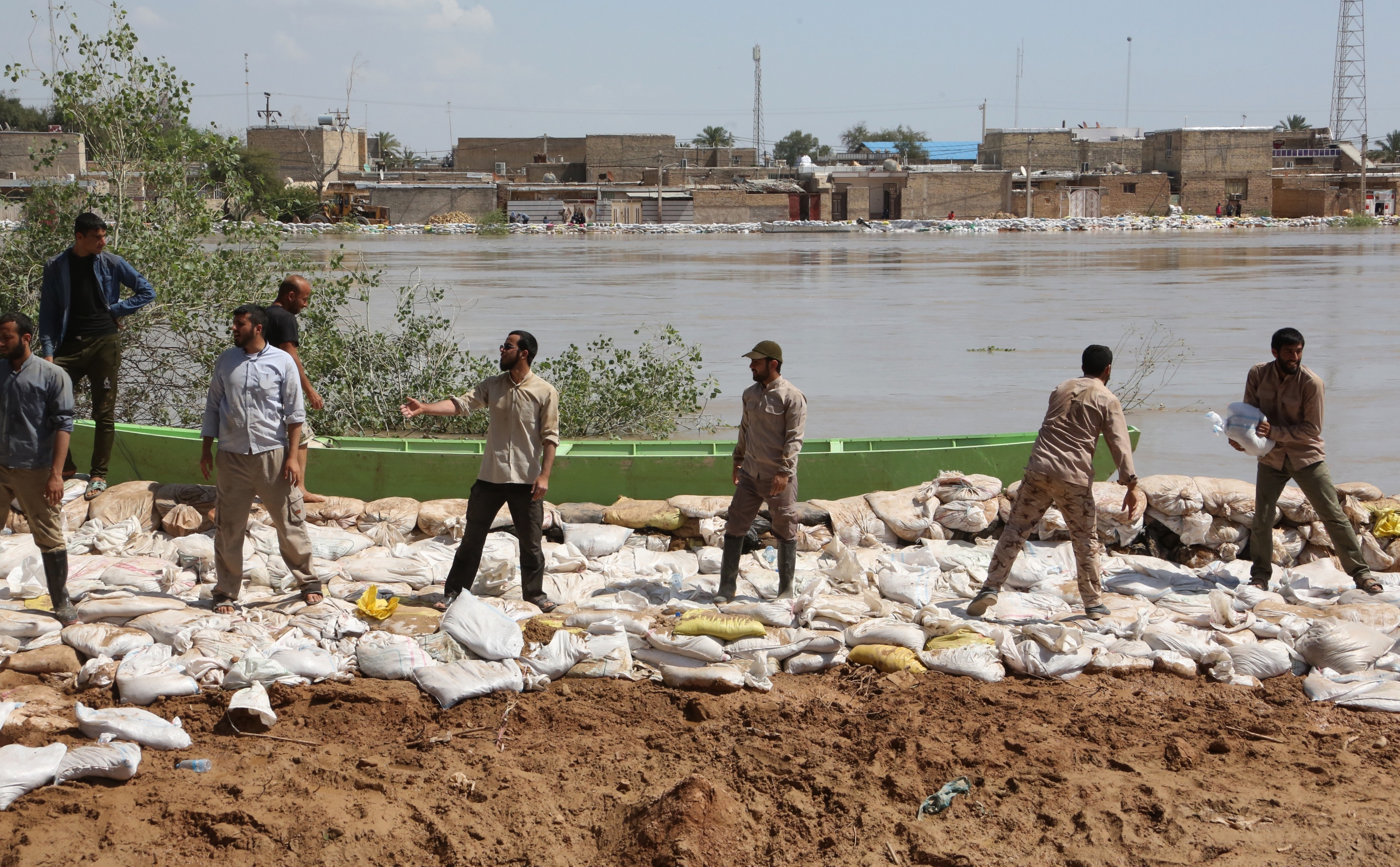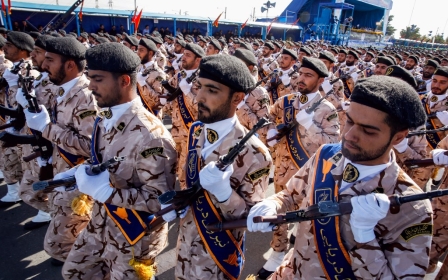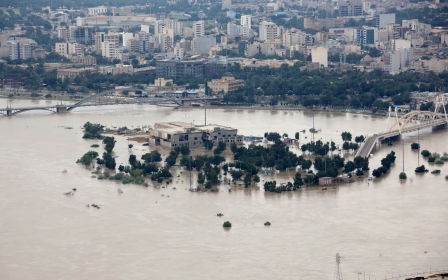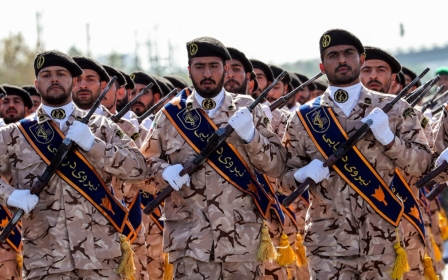Iranian press review: Controversy as Iraqi militia enter Iran's flood-hit regions

Hashd al-Shaabi’s flood aid sparks outcry
Iraq's Hashd al-Shaabi forces - also known as the Popular Mobilisation Units (PMUs) - have been deployed to Iran to provide aid to residents of the country's western provinces hit by a flood that has so far claimed 76 lives and caused over $2.2bn in damages, ISNA news agency reported.
On 12 March, 200 Iraqi forces entered the Ilam and Khuzestan provinces, where flood warnings are still in effect, the news agency said. Hashd al-Shaabi forces are Iranian-backed irregular Iraqi troops who have been fighting Islamic State.
On the same day, the Kayhan daily also reported that forces from Iraq, Afghanistan and Pakistan had entered Iran at the behest of General Qassem Soleimani, leader of the Quds Force of Iran's Revolutionary Guard Corps (IRGC), to support Iranians hit by the floods.
Meanwhile, a video showing an Iranian resident of Khuzestan criticising the authorities for allowing Iraqis to enter the country, has sparked controversy among social media users.
New MEE newsletter: Jerusalem Dispatch
Sign up to get the latest insights and analysis on Israel-Palestine, alongside Turkey Unpacked and other MEE newsletters
Some Iranian celebrities, such as Mahnaz Afshar, praised the man in the video for having “mettle,” while others condemned him for displaying racism against Arabs, especially Iraqis.
“It’s not strange for a citizen to say such remarks as societies fall for nationalism when they become weak and humiliated,” Iranian writer and social researcher Amin Bozorgian wrote on Twitter. “But you, as a celebrity, should correct him instead of describing him as [having] 'mettle’.”
Racism is an issue of concern in Iran, where some Iranians view themselves as superior to Arab, Turkish and Afghani populations, while Fars people sometimes show racism against other Iranian ethnic groups.
'Islamophobe trickster clown'
A talk in support of US sanctions against Iran by the Iranian-American anti-hijab advocate Masoumeh Alinejad Qomi – also known as Masih Alinejad – at the 10th annual Women in the World Summit in New York City, as well as her Independent opinion piece on the same theme, has outraged Iranian intellectuals.
“In 72 hours, our Islamophobe trickster clown along with Trump’s adherents, attacked Ilhan Omar, and sold out Hemmat and Bakeri [two Iranian commanders who died during the Iran-Iraq war] to Pompeo,” Hossein Derakhshan, an Iranian researcher at MIT Media lab, wrote on Twitter.
Derakhshan is a former political prisoner who spent six years in Iran’s infamous Evin prison.
In response to Alinejad’s article in the Independent on what she described as brainwashing in Iran, Leial Samani, another Iranian Twitter user, posted a Wikileaks-released video of a US helicopter gunship killing Iraqi civilians.
“Where is Alinejad to understand the meaning of brainwashing,” Samani wrote on Twitter. “One of the US’s pretexts to labelling IRGC a terrorist organisation is to avenge these criminal [US] soldiers, but no one is asking what were they doing in Iraq to begin with.”
Iranian linguist Hamidreza Sedaghat also examined Alinejad’s talk at the summit, describing it as “an exotic show” presenting Alinejad as “a brown woman free in the West,” an attitude that, according to Sedaghat, degrades “eastern brown women who believe in hijab”.
Nurses' exodus
Officials in the health sector have warned of the rising number of Iranian nurses emigrating to foreign countries due to low salaries and harsh working conditions, the Aftab daily reported.
Arab states in the Gulf, along with Australia and Canada are the main host countries for the Iranian nurses. Since the US reimposed sanctions on Iran in May 2018, the monthly salary of Iranian nurses has fallen in purchase value from $600 to $200, according to Iran Economist.
Meanwhile, officials stated that no data is available on the exact number of nurses leaving Iran for better working conditions.
On 15 April, Mohammad Moghadam, the head of an Iranian nursing syndicate, said that 400 nurses process their work documents at the syndicate annually to begin the emigration process.
However, many others seek the help of emigration lawyers without the need to pass documents through the syndicate.
The rising number of nurses leaving Iran occurs at a time when the country is dealing with a shortage of about 80,000 nurses, ISNA news agency reported.
Iran's rial to lose four zeros
The economy commission of President Hassan Rouhani's administration plans to slash four zeros from the country’s currency the rial, the Iran daily reported.
Proposals for slashing zeros from the collapsing Iranian currency have been around since 2003, when the first sharp fall in the rial against foreign currencies took place. In 2008, during the presidency of Mahmoud Ahmadinejad, the plan was tabled but no actual measures were taken for its implementation.
On 6 January, Iran’s central bank renewed its proposal to remove four zeros from the Iranian currency and finally on 16 April the Iranian administration took measures to put it into effect.
According to the proposal, the Iranian currency will be renamed the "touman".
Iran’s central bank has argued that the removal of four zeros from the national currency is necessary due to the high inflation rate. However, many economists believe that the proposal is not a long-term solution for Iran’s economy, weighed down by corruption and US sanctions.
*Iranian press review is a digest of reports that are not independently verified as accurate by Middle East Eye.
Middle East Eye delivers independent and unrivalled coverage and analysis of the Middle East, North Africa and beyond. To learn more about republishing this content and the associated fees, please fill out this form. More about MEE can be found here.





